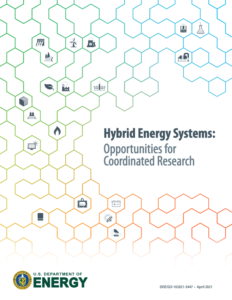Full Title: Hybrid Energy Systems: Opportunities for Coordinated Research
Author(s): U.S. Department of Energy
Publisher(s): U.S. Department of Energy
Publication Date: April 19, 2021
Full Text: Download Resource
Description (excerpt):
To meet the evolving demands of the 21st century, the U.S. power grid is undergoing transformational changes that defy its traditional design of large-scale generation remotely located far from consumers, centralized control structures with minimal feedback, limited energy storage, and passive loads. Over the last decade, the U.S. electric generation mix has changed dramatically, with increased generation from highly-flexible natural gas, rapid deployment and penetration of variable renewable resources, and decreased generation from traditional baseload resources. Other changes that are beginning now and expected to accelerate in the near term include increased deployment of energy storage technologies and greater use of digital and communication technologies in the control of power systems. The introduction of new sources of dispatchability, flexibility, and reliability offers the potential for a more optimized, cost-effective, and modern energy sector from fuel to generation to delivery to load. One key trend in the evolving U.S. energy sector is the emergence of hybrid energy systems (HES). We define HES in this report as systems involving multiple energy generation, storage, and/or conversion technologies that are integrated—through an overarching control framework or physically—to achieve cost savings and enhanced capabilities, value, efficiency, or environmental performance compared to the independent alternatives. This definition is consistent with—but broader than—industry definitions.1 And as defined here, HES are related to, but distinct from, colocated resources, which share some characteristics with HES but have more-limited opportunities for operational synergies.
